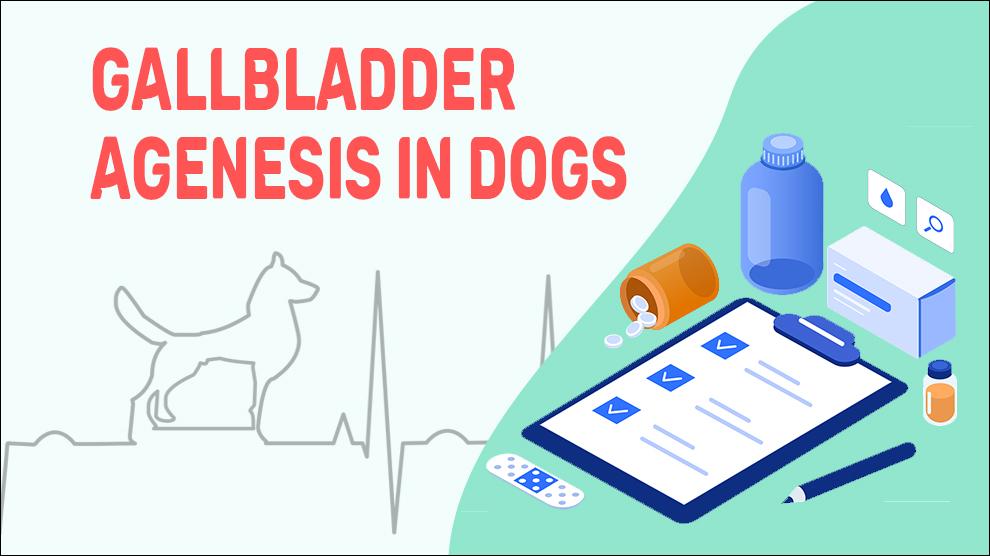What Is Gallbladder Agenesis In Dogs?
Gallbladder Agenesis (GA) is an extremely rare congenital anatomic condition characterized by the nonexistence of the gallbladder in tandem with a proper bile duct system.
Gallbladder agenesis can present with symptoms similar to cholecystitis. If the gallbladder is not visualized well on the ultrasound, and additional radiological examination is required.
This disease terminology really sounds odd and so are the symptoms, they also present really vague symptoms. Moreover, sometimes other disorders/conditions can occur at the same time as gallbladder agenesis, which makes identifying the cause of the symptoms rather difficult.
Using the appropriate investigations, the Veterinarian's understanding of the condition help to correctly diagnose the condition preoperatively and thereby minimize the operative risk of the dog.
Symptoms Of Gallbladder Agenesis In Dogs
- Abdominal distension, Abdomen swollen, Larger than normal.
- Bloating
- Nausea
- Icterus or jaundice (yellowed eyes and gums).
- Hypothermia
- Anorexia
- Vomiting
- Abdominal fluid accumulation
- Anorexia to different degrees.
- Hyperbilirubinemia
- Hypercholesterolemia
- Weight loss, Dehydration
- Diarrhea
- Right-sided discomfort upon examination.
- Inappetence
Treatment Options For Gallbladder Agenesis In Dogs
There is no treatment for GA.
Antibiotics, corticosteroids, and Pain medication will be used to control infection and inflammation.
Hypoproteinemia (low level of protein in the blood) is common in some dogs so nutritional support may be provided with the feeding tube.
For the anorexic, nauseated, and systemically ill dogs, hospitalization for supportive therapy such as intravenous fluids might be required.
Other drugs and the need for surgery will be entirely at your vets’ disposal after determining the cause of the leakage.
Home Remedies For Gallbladder Agenesis In Dogs
Add flavor to water (bone broth or chicken broth) or add wet food to his food ration.
If any specific diet has been suggested to your dog, follow the diet very strictly, and never provide or allow others to give your dog treats or other food.
Follow all of the veterinarian’s instructions and adhere to your dog's drug schedule properly (don’t miss a dose or overdose).
Prevention Of Gallbladder Agenesis In Dogs
Prevention of gallbladder agenesis is not possible as it is a congenital condition. Prevention from other gallbladder-related issues and related complications can be done with the help of a Vet recommendation. This is an extremely rare disorder and as of now, it has been diagnosed only in lesser numbers.
Precautionary use of antimicrobials (β-lactam (e.g., Cefaxolin) combined with a fluoroquinolone or aminoglycoside) has been used to control the risk of infections; though, if this is overused, it may spawn antibiotic-resistant organisms in due course.
Pet owners should discuss how to prevent or decrease the possibility of recurrence of gallbladder problems with their vet.
Affected Dog Breeds Of Gallbladder Agenesis
Small Dog Breeds. There is no breed disposition. Some breeds are overrepresented.
German Shepherd, Chihuahua, Jack Russell Terrier, Maltese, Shiba Inu
Causes And Diagnosis For Gallbladder Agenesis In Dogs
- Causes:
This is a rare, congenital abnormality.
- Mortality:
Gallbladder agenesis is not considered a medical emergency. While the dogs can survive without a gallbladder, owners’ should make some adjustments to the ‘no gallbladder’ lifestyle and modify dog eating habits to avoid any problems.
- Diagnosis:
- Endoscopic retrograde cholangiopancreatography (ERCP).
- Percutaneous transhepatic cholangiogram (PTCA).
- Urinalysis and bloodwork
- Serum biochemistry profile
- X-rays
- Ultrasound, CT scan
- Prognosis:
Diagnosis of this condition is also hard as the signs of this condition are often subtle or confusing. When you identify that your pet has other predisposing conditions, such as Peritonitis, treatment directed to prevent peritonitis should be performed.
When To See A Vet For Gallbladder Agenesis In Dogs?
An appropriate diagnosis of this disease is always best left to your vet to make sure that it is not progressing into a serious form. Contact the vet immediately, when you notice below mentioned symptoms.
- Abdominal distension, Abdomen swollen, Larger than normal.
- Icterus or jaundice (yellowed eyes and gums).
- Hypothermia
- Abdominal fluid accumulation
Food Suggestions For Gallbladder Agenesis In Dogs
Foods to avoid:
- Cut down fat and high fiber intake of the dogs.
- Spicy foods, Greasy, fatty, and fried foods, and Allergens (gluten, soy, and dairy).
- Eliminate colorings, preservatives, additives, and flavors from your pet’s diet.
- Avoid Late-night feedings.
Lean meats or meat alternatives:
- Chicken breast
- Ground meat(beef, pork, chicken, turkey).
- Salmon, Trout, Herring
- White fish like cod and halibut.
Nutrient-dense, vitamin-dense fruits and veggies:
- Legumes, such as lentils, peas, or beans.
- Cauliflower, Cabbage, Broccoli.
- Spinach, Kale
- Tomatoes
- Citrus, such as oranges and limes.
- Avocadoes, Blueberries, Blackberries, Raspberries
Conclusion
As in many cases, the Gallbladder agenesis etiology is often serious in nature and it can be treated efficiently if it is diagnosed early. Dogs can definitely live without a gallbladder. This also shouldn’t have any impact on their life expectancy. However, the changes in diet you’ll need to make may even help the dogs live a healthier, longer life.
Regular follow-up appointments with your veterinarian are essential as recovery would be slow. Always follow the progress and adjustment of the drugs or treatment techniques as necessary.

















